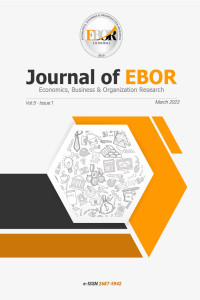Abstract
References
- Assman, J. (2001). Cultural Memory–Writing, Remembrance and Political Identity in Ancient High Cultures. Ayrıntı Publications, Istanbul.
- Avcı, Ö. (2019). History Series as a Tool to Historicize the Past: Diriliş, Payitaht, Kûtul’amâre. Journal of Sociology, Volume 39, 103-139.
- Connerton, P. (1999). How Do Communities Remember? Tra.: Alâeddin Şenel. Ayrıntı Publications, Istanbul.
- Çınar, Ö. F. (2018). Turkish TV series destroy prejudices. GZT.com. on 30.06.2019. Obtained from: https://www.gzt.com/aktuel-kultur/turk-dizileri-on-yargilari-yikiyor-3431893.
- Halbwachs, M. (2017). Collective Memory. Tra.: Banu Barış. Heretik Publications, Ankara.
- Doğanay, M.M. & Aktaş, M. K. (2021). Televısıon Serıes Industry In Turkey. Marmara Üniversitesi Öneri Journal, 16 (56), 852-878.
- Medin, B. (2019). Power, Memory and Cinema. Journal of Akdeniz University Faculty of Communication. June (31), 123-146.
- Mutlu, Erol. (2012). Communication Dictionary. Sofos Publications, Ankara.
- Nye, J. (2005). Soft Power. R. İnan Aydın (Tra.). Elips Publications, Istanbul.
- Spring in the Middle East with Turkish soap operas. (2012, 29 June). YouTube. On 02.07.2019. Obtained from: https://www.youtube.com/watch?v=99NpSTkXDtA
- Özarslan, K. (2020). Turkish TV Series in the International Press and the Image of Turkey in the Context of Country Branding. Dokuz Eylül Üniversity, Journal of the Social Sciences Institute, 22 (1), 215-238.
- Özgüneş, R.E. (2020). Living in Tastes Longing for the Past: Gastronostalgia. International Journal of Turkish World Tourism Studies, 5(1), 60-75.
- Randall, W. L. (1999). Stories That Make Us Who We Are. Ayrıntı Publications, Istanbul.
- Yıldırım, A. & Şimşek, H. (2016). Qualitative Research Methods İn the Social Sciences. Seçkin Publications, Istanbul.
Abstract
Turkish television series have also achieved significant success in the recent period and started to be exported to more than 250 countries from many continents. This situation has led to an increase in diplomacy traffic in interstate communication, and the discovery of Turkish culture by the citizens of other countries with interest. At this point, whether television series representing Turkish culture contain positive or negative images has been of interest to researchers in this field. While the number of touristic visits to Turkey has increased, the positive or negative image of the country has created the problem of this study. With this study, some television series that have been exported in the last period have been examined, and it has been tried to reveal how they are reflected in terms of the themes discussed and the places represented. The study was conducted by adopting the principles of the qualitative research method. The design of the research is case study. By applying to document analysis data in the literature related to the subject were collected. The situation of the data collected in this study was analyzed by descriptive analysis and aimed to contribute to the existing situation in the literature. The results show that Turkish television series represent Turkish culture with its positive and negative aspects. It is thought that the TV series industry should be developed in relevant contexts. It has been concluded that it should be supported by different media tools within the scope of creative industries.
Keywords
References
- Assman, J. (2001). Cultural Memory–Writing, Remembrance and Political Identity in Ancient High Cultures. Ayrıntı Publications, Istanbul.
- Avcı, Ö. (2019). History Series as a Tool to Historicize the Past: Diriliş, Payitaht, Kûtul’amâre. Journal of Sociology, Volume 39, 103-139.
- Connerton, P. (1999). How Do Communities Remember? Tra.: Alâeddin Şenel. Ayrıntı Publications, Istanbul.
- Çınar, Ö. F. (2018). Turkish TV series destroy prejudices. GZT.com. on 30.06.2019. Obtained from: https://www.gzt.com/aktuel-kultur/turk-dizileri-on-yargilari-yikiyor-3431893.
- Halbwachs, M. (2017). Collective Memory. Tra.: Banu Barış. Heretik Publications, Ankara.
- Doğanay, M.M. & Aktaş, M. K. (2021). Televısıon Serıes Industry In Turkey. Marmara Üniversitesi Öneri Journal, 16 (56), 852-878.
- Medin, B. (2019). Power, Memory and Cinema. Journal of Akdeniz University Faculty of Communication. June (31), 123-146.
- Mutlu, Erol. (2012). Communication Dictionary. Sofos Publications, Ankara.
- Nye, J. (2005). Soft Power. R. İnan Aydın (Tra.). Elips Publications, Istanbul.
- Spring in the Middle East with Turkish soap operas. (2012, 29 June). YouTube. On 02.07.2019. Obtained from: https://www.youtube.com/watch?v=99NpSTkXDtA
- Özarslan, K. (2020). Turkish TV Series in the International Press and the Image of Turkey in the Context of Country Branding. Dokuz Eylül Üniversity, Journal of the Social Sciences Institute, 22 (1), 215-238.
- Özgüneş, R.E. (2020). Living in Tastes Longing for the Past: Gastronostalgia. International Journal of Turkish World Tourism Studies, 5(1), 60-75.
- Randall, W. L. (1999). Stories That Make Us Who We Are. Ayrıntı Publications, Istanbul.
- Yıldırım, A. & Şimşek, H. (2016). Qualitative Research Methods İn the Social Sciences. Seçkin Publications, Istanbul.
Details
| Primary Language | English |
|---|---|
| Subjects | Communication and Media Studies |
| Journal Section | Research Articles |
| Authors | |
| Publication Date | March 31, 2023 |
| Published in Issue | Year 2023 Volume: 5 Issue: 1 |
This work is licensed under a Creative Commons Attribution-NonCommercial-NoDerivatives 4.0 International License.


